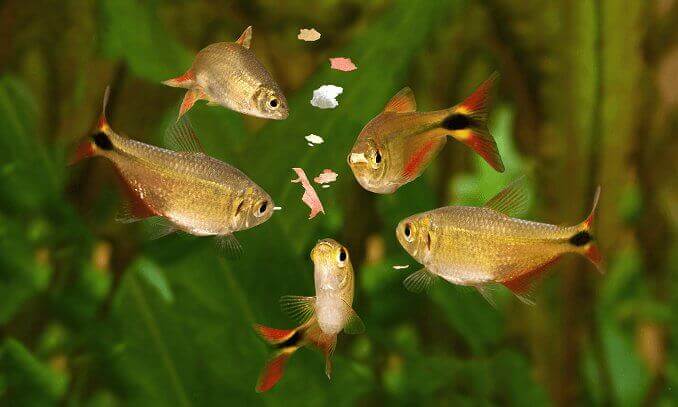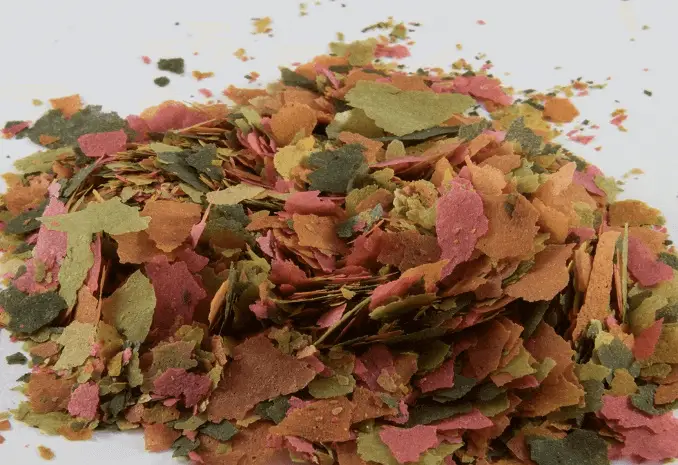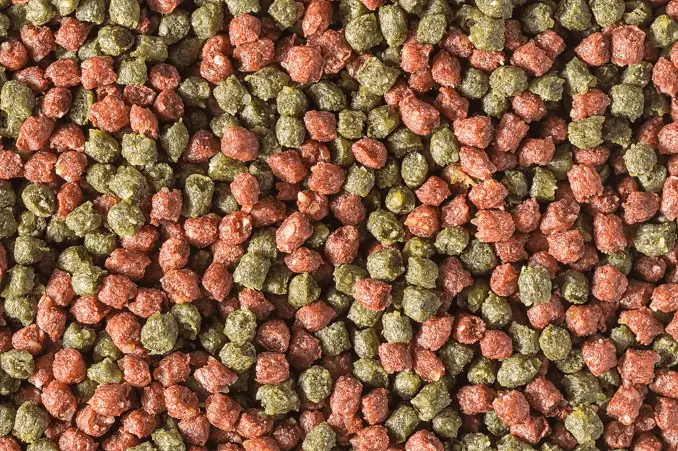What Kinds of Things Can You Feed a Fish What Things Not to Feed a Fish
The question of what fish eat cannot be answered with one specific and generic fish food, as many fish stores will have you believe.
Fish eat a wide variety of things; however, their specific diet depends on their natural environment, the eco-system in which they live, and a host of other reasons.
Some fish are sluggish scavengers and will eat whatever they come across, whereas other fish's diets consist solely of eating other fish.
Fish generally fall into three categories; carnivore, herbivore, and omnivore.
Whilst many humans make their diet a lifestyle choice, for example by not eating meat or any animal-based products, it is not a choice for fish. Certain species require meat, and others don't. This is largely decided by their environment, as well as specific features such as their mouth, teeth, and digestive tract.
In this article, we will explain what fish eat. Knowing and understanding which category your aquarium fish fall into, what types of food they should be eating, how often and how much they should eat is essential if you want to keep healthy fish.
Get Your Free Extra: Download our Guide on What Do Fish Eat to learn all about the different things that various species eat.
What Should You Feed Your Fish?
 Fish need proteins, carbohydrates, fats, and some minerals and vitamins. The amount of each food type they need depends entirely on the species, and whether they are a carnivore, herbivore, or omnivore. Let's start by looking at carnivores.
Fish need proteins, carbohydrates, fats, and some minerals and vitamins. The amount of each food type they need depends entirely on the species, and whether they are a carnivore, herbivore, or omnivore. Let's start by looking at carnivores.
Carnivores
Carnivorous require a protein-rich diet, consisting of plenty of meat in either live or dead form. Species include Piranhas, Cichlids, Arowanas, Bettas, Killifish, and Pipefish.
Carnivores typically have a larger mouth with pointed teeth which allow them to rip and tear their prey. They also have shorter digestive tracts and large stomachs when compared to omnivores. Most carnivorous fish are natural predators and enjoy a chase, some are scavengers. In the wild, they feast on live fish, insects, larvae, and crustaceans.
All fish require some amount of protein; however, a carnivore's diet should be made up of 45% to 70% protein. In addition to proteins, these fish also need some fats to insulate the body, and small amounts of carbohydrates to provide energy.
Carnivorous fish cannot handle or digest large amounts of carbohydrates and so the small amounts of plant matter that they eat will suffice.
To replicate this in your aquarium, you can offer your fish a variety of live and frozen foods.
Recommended Foods
Insects
Blood worms, white worms, tubifex worms and micro worms are available in live and frozen forms and provide good amounts of protein.
Be aware that some worms can carry disease due to the conditions they have been bred in; they should be rinsed thoroughly and observed for a few days in a separate tank before you feed them to your fish.
The beauty about feeding live food is that none of the nutrition is lost, and some live foods such as brine shrimp and micro-worms can be grown at home.
Fish
You can feed your fish a mixture of live, frozen and cooked fish. Some carnivorous fish enjoy hunting and so live fish can be beneficial for them for exercise.
Most meats are not suitable for your fish because they are high in fat, however you can feed them beefheart which isn't as fatty once trimmed – just don't feed this in excess!
Note: A word of warning about feeder fish!
Feeder fish are small fish bred specifically for feeding purposes. Whilst they are cheap, they are often bred in poor conditions and can easily introduce disease into your tank; they also carry little nutritional value. If you do choose to use feeder fish, quarantine them for a week before introducing them to your tank.
Other Live Foods
Brine shrimp is one of the best live foods you can feed your fish. Whilst live shrimps can be expensive, frozen brine shrimp is more affordable.
Daphnia are also a popular choice of live food, and whilst not widely available at stores, you can find them at local fish clubs and start breeding your own.
Dried Foods and Supplements
You can also feed your carnivorous fish a number of dried foods and supplements; you can read more about this in the omnivore section below.
Herbivores
Herbivores only consume plant matter; this is more difficult to digest than meats. Their diet includes large amounts of fiber, which is difficult to digest and so they have a longer digestive tract than carnivores.
A herbivorous fish's diet consists of plants, algae, vegetables, and fruits. Unlike carnivorous fish, they don't have a true stomach; instead, their intestine breaks down the food. For this reason they need to eat more frequently.
They have flat teeth which helps them to grind food before they swallow. Examples of herbivores include surgeonfish and parrotfish.
They are vital in maintaining the ecological balance within coral reefs to keep algae in check.
In the wild, herbivorous fish will graze on plants, algae and other vegetable matter. There are actually very few true herbivorous fish; most fish need at least a small amount of meat protein.
Recommended Foods
Plants and Algae
Placing a number of live plants and algae in your tank is a good start for feeding your fish but you shouldn't rely on these two options alone.
True herbivorous fish tend to suffer in aquariums because there simply isn't enough natural plant matter to feed them appropriately if you only give them live plant and algae options.
You should also give them algae wafers to supplement their diet, and flake foods developed for herbivores.

Vegetables and Fruit
You can feed your fish blanched vegetables such as zucchini, peas, lettuce, and spinach.
Vegetables are full of the minerals and vitamins that herbivorous fish need. You can also feed your fish small amounts of fruit including apples and pears.
Supplements and Dried Foods
Herbivores also need a number of supplements; you can see the section below on omnivores to learn more about this.
Omnivores
Omnivores consume both meat and plant matter. They possess some of the digestive tract traits of both a carnivore and a herbivore; such as the batfish.
They are possibly the most easy to care for fish, as they will eat a combination of all the suggestions above.
All three categories of fish require vitamins and minerals in their diet to promote healthy growth. Most aquarists supplement their fish's diet to ensure all the nutritional requirements are met.
In particular they need:
- Vitamin C to promote bone development, healing and digestion.
- Vitamin B2 and B6 to help with enzymes.
- Vitamin B1 to assist with the breakdown of carbohydrates.
- Mineral wise, they require calcium, phosphorous and manganese.
Recommended Foods
You can feed omnivores any of the foods in the carnivore and herbivore sections; omnivores do not require as much protein though. Protein should make up a maximum of 40% of their diet.
Dried Commercial Foods

Many people choose to feed their fish dried commercial food. You can feed your carnivorous fish a selection of dry foods including flake, granules, pellets and discs.
Depending on the water column that the fish occupies (top, middle or bottom) you should consider different dried foods. For example flakes are great for most fish, but especially those who eat at the top of the aquarium, whereas discs are typically a sinking food and suit bottom feeders.
You should always check the ingredients for 'filler foods'. Ingredients are always listed in order of weight so you should be looking for nutritious ingredients at the top of the list, and as few carbohydrates as possible.
Typical ingredients you want to look for in pre-prepared food include fish meal, shrimp meal, squid meal, earthworms, and Spirulina.
Homemade Fish Food
Perhaps one of the best ways to make sure your fish is getting the best possible diet, is to make your own food at home.
It's a lot easier than it sounds; you can batch make your food which will save you time and money.
How Often and How Much Should You Feed Your Fish?
If anything, it's better to feed your fish too little rather than too often.
If you over-feed your fish you can end up with a whole host of problems including changes to the water quality, which in turn, affects the fish.
Not only does the left-over food which has gone uneaten start to rot in the tank, but fish that have eaten too much also create more waste. Overfeeding can also cause: low oxygen levels, fin rot, fatty liver, flatworms, and clogged filters.
The main things to take away from overfeeding, is that it can affect your tank conditions and your fish's health. Spot the signs sooner rather than later and they can usually be remedied as long as you change your feeding routine.
How to Avoid Overfeeding Fish
Fish often get used to the fact that when someone approaches the tank, they are going to be fed, so it may appear that they look hungry if they start swimming around the front of the tank as they see you approach. Usually they aren't – so don't worry!
So, how often and how much should you actually be feeding your fish?
This all depends on the species you have. It's important to remember that in their natural environment, fish usually graze all day long rather than have a set feeding time. It is near impossible to replicate this in the tank and so most fish should be fed twice a day.
The type of food you feed them is also very important – it's down to the specific breed as to whether they need live food, plant based food, sinking pellets or flakes.
The only real way to find out what the 'proper amount' is for your fish is trial and error. Start off with small amounts of food, and increase depending on how much they eat.
As a general rule: only to feed them as much as they can eat in around a 5 minute period, and then remove the left-over food to prevent it breaking down and altering the water quality.
Remember to feed to the amount of fish you have, rather than the tank size.
So, What Should You Feed Your Fish (Summary)?
As you can see above, it's vital that you understand the exact dietary requirements of your fish so that you can encourage healthy growth.
The type of food that will help your fish to thrive varies depending on the environment they originate from, and the species of fish.
Some fish require a diet of high protein, other require a lot of plant matter.
For the best result, you should choose a wide variety of the options we have listed above to ensure your fish get the varied diet they need, or even make your own food.
What do you feed your fish? We'd love to hear below if you have any other suggestions on what to feed fish.
Source: https://www.fishkeepingworld.com/what-do-fish-eat/
Post a Comment for "What Kinds of Things Can You Feed a Fish What Things Not to Feed a Fish"